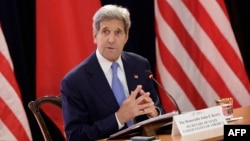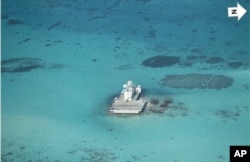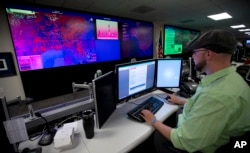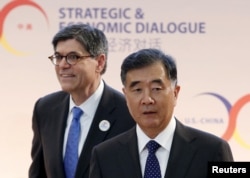U.S. and Chinese officials were frank in discussing differences between the two countries Tuesday, as they opened key annual talks, but both sides agreed that confrontation was not in the world's best interest.
In opening the U.S.-China Strategic and Economic Dialogue, U.S. Vice President Joe Biden said, "We are not going to solve all of these problems in this meeting ... but we have to be committed to working towards solutions."
"This relationship is just too important," Biden said. "Not only [do] we depend on it, but the world depends on our mutual success."
China also expressed a desire for constructive relations with the United States.
In equally frank comments, Chinese Vice Premier Wang Yang agreed Beijing and Washington do not agree on everything. But he insisted "confrontation is a negative-sum game," adding that "dialogue is always more preferable than confrontation."
Warning over seaways
The Cabinet-level meetings, which began in Washington Monday and run through Wednesday, take place amid growing tensions over charges of cybertheft and China's island building in the South China Sea.
Regarding territorial disputes among Asian neighbors in the South and East China Seas, Biden issued a sharp warning to Beijing, saying the world's waterways must remain "open and protected" for trade.
"Responsible countries adhere to international law and work together to keep international sea-lanes open for unimpaired commerce," Biden said. "Eighty percent of all the commerce today is on the back of a ship somewhere floating on the oceans.
"The notion of sea lanes being open and protected is even more crucial today than any time in human history, because of the interconnectiveness of the world," he added.
The two countries remain at odds over Beijing's claims to much of the South China Sea and Washington has repeatedly urged an end to China building artificial islands in the area. However, China said last month it will project its military power further beyond its borders at sea and more assertively in the air.
'Very frank' discussions
Secretary of State John Kerry said he was looking forward to a "very frank" discussion on cybersecurity, Internet freedom, human rights and religious freedom.
On the issue of cybersecurity, the State Department official said "will certainly be talked about in very direct terms."
A senior State Department official said, "The issue will be addressed in pretty direct terms with the Chinese."
The U.S. is particularly concerned by recent massive attacks on government computers, with officials blaming Chinese hackers with accessing about 14 million employee records of the Office of Personnel Management.
Treasury Secretary Jacob Lew said the U.S. remains “deeply concerned about government-sponsored cyber theft from companies and commercial sectors,” adding both nations must "abide by certain standards of behavior within cyberspace."
State Councilor Yang Jiechi said during the opening session China would work with the United States and other countries on cybersecurity issues.
"We think that cybersecurity is very important," Yang said through a translator, adding China was ready to work closer with the U.S. on protecting intellectual property.
He also said countries should work together to develop an international code of conduct on cyber information-sharing.
Meanwhile, Kerry said the two countries -- the world's two largest emitters of greenhouse gases -- were working "effectively" to try to reduce emissions ahead of a key U.N.-led Paris conference on setting new targets in December.
Lew said it was critical for China to move toward a more market-oriented exchange rate, repeating a U.S. mantra even though the International Monetary Fund has said the yuan is no longer undervalued.
The talks also come at a time when U.S. President Barack Obama is struggling to secure backing from Congress for legislation needed to speed a 12-nation trade deal, which is the economic plank of his "pivot to Asia" policy intended as a counterweight to China's growing influence.
Obama is scheduled to meet Wednesday with members of the Chinese delegation.
Despite considerable tension over some issues, China is hoping for a smooth set of meetings to prepare for a visit to Washington by President Xi Jinping in September.
Despite issues that likely won't be resolved this week, such as cyber and human rights issues, U.S. and China are stressing areas of cooperation, including climate change, shared concerns about nuclear programs in Iran and North Korea, the fight against Islamist extremism, and support for global development.
Climate initiatives
On Monday, Energy Secretary Ernest Moniz outlined a series of collaborative efforts between the U.S. and China on climate change, including a Carbon Capture Utilization and Storage project.
The renewable energy project involves capturing carbon dioxide emissions from sources such as coal plants with a goal of either reusing the emissions or storing them so that they do not enter the atmosphere.
“The United States and China continue to lead the drive to press our clean energy ambition further, both in our countries and globally,” said Moniz.
At the same session on Monday, China’s Special Representative for Climate Change, Xie Zhenhua, said the U.S. and China could have a significant impact on climate change at the bilateral and multilateral levels.
VOA's William Gallo contributed to this report. Some material came from Reuters and AFP.







